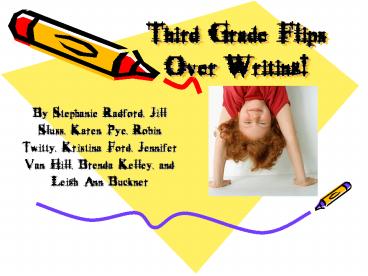Third Grade Flips Over Writing - PowerPoint PPT Presentation
1 / 10
Title:
Third Grade Flips Over Writing
Description:
Spelling/grammar. Neatness/legibility 'Don't break the rules!' Why is this the best ... We teach mini lessons that concentrate on each component of the rubric. ... – PowerPoint PPT presentation
Number of Views:959
Avg rating:3.0/5.0
Title: Third Grade Flips Over Writing
1
Third Grade Flips Over Writing!
- By Stephanie Radford, Jill Sluss, Karen Pye,
Robin Twitty, Kristina Ford, Jennifer Van Hill,
Brenda Kelley, and Leigh Ann Buckner
2
Flipped Out
- When introducing the Writing Rubric, students are
given a flip book with four flaps One for each
of the rubric components. - One component is modeled daily in our writing
mini-lesson. Students will draw and label a
writing rubric flip book that they will keep all
year as a reference. - (See examples)
3
Content
- We make a child friendly list of the ingredients
needed to make a good hamburger - Main idea
- Details
- Descriptions
- Restate the main idea
- The meat and trimmings
4
Organization
- We model for the students, how to build a snowman
to show the order of a story - Beginning
- Middle
- End
- Ideas in Order
- Stack your ideas in order.
5
Voice
- Teachers model how to add voice to
a story, by using - Vivid Vocabulary
- Special sentences
- Correct format
- The cat runs down the street OR The black cat
scurried down the dark alley.
6
Conventions
- Teachers discuss how life has rules that we must
obey, just like in writing - Punctuation
- Capitalization
- Spelling/grammar
- Neatness/legibility
- Dont break the rules!
7
Why is this the best thing we do all year?
- We teach mini lessons that concentrate on each
component of the rubric. - Students write compositions, focusing on one
component at a time. They read aloud their
writings as the class scores them 4, 3, 2, or 1. - Throughout the year, students are able to refer
to this flipbook, check themselves, and apply it
to their writing. - Teachers exchange anonymous Benchmark writing
samples on the overhead for students to score,
using their flipbooks. Samples show student work
at various levels.
8
Model for Persuasive WritingProject Challenge
- Students use the Hamburger Model graphic
organizer as they apply specific elements of
reasoning to evaluate the effectiveness of their
persuasive writing. These elements include - Are there enough reasons to make a convincing
argument? - Is the evidence correct?
- Are the reasons clear? Is the meaning
understandable? - Are specific reasons or examples included rather
than generalizations? - Are the arguments and reasons strong and
important? - Is the thinking logical?
- The Hamburger Model is only a foundation for
student writing. Beyond the model, students
receive instruction to strengthen ideas, word
choices, organization, sentence fluency, and
writing voice. Other ELA teaching models include - Taba Model of Concept Development
- Literature Web Model
- Vocabulary Web Model
- Reasoning Model
- Writing Process Model
- Research Model
9
3rd Grade Project Challenge
- ELA Teaching Models
- Taba Model of Concept Development
- Literature Web Model
- Vocabulary Web Model
- Hamburger Model for Persuasive Writing
- Reasoning Model
- Writing Process Model
- Research Model
- The Language Arts Units for high ability
learners have been aligned with English standards
developed by the National Council of Teachers of
English (NCTE) and the International Reading
Association (IRA). These units are also aligned
with the ELA standards of South Carolina and
Anderson District 5.
10
3rd Grade Project Challenge ELA
- Students will
- Develop analytical and interpretive skills in
literature - Develop persuasive writing skills
- Develop linguistic competency
- Develop listening/oral communication skills
- Develop reasoning skills in the language arts
- Understand the concept of change in the language
arts. - The language arts curriculum exposes students to
exemplary works of literature that challenge
critical reasoning and provide an opportunity to
better understand themselves and the world around
them.































